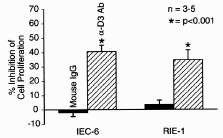Abstracts
1998 Digestive Disease Week
#1064
CYCLIN D3 IS ESSENTIAL FOR INTESTINAL EPITHELIAL CELL PROLIFERATION. T.C. Ko, F. Pan, D.B. Brown, E.A. Thompson, R.D. Beauchamp*. Department of Surgery, The University of Texas Medical Branch, Galveston, TX and *Department of Surgery, Vanderbilt University School of Medicine, Nashville, TN.
Growth factors and nutrients regulate the cell cycle principally at the G1 phase by controlling expression of D-type cyclins (types 1-3). Previously, we have shown that expression of cyclin D3 is not inhibited by fasting in rat small bowel mucosa nor by anti-mitogenic peptide transforming growth factor beta-1 in rat intestinal epithelial cell lines (IEC-6 and RIE-1). These results suggest that cyclin D3 may not have a functional role in the gut. In this study, we determined whether cyclin D3 expression is essential for intestinal cell proliferation by utilizing microinjection technology to specifically inhibit cyclin D3. METHODS. IEC-6 and RIE-1 cells (100,000/plate) were synchronized in G0 by incubating in serum-free medium for 48 h. To determine cell viability, either cytoplasmic or nuclear microinjections were performed using nonspecific mouse IgG (10 µg/µl). Cells were labeled with fluorescein-conjugated goat anti-mouse antibody and stained with Giemsa stain. To inhibit cyclin D3, cells underwent cytoplasmic microinjections with either anti-cyclin D3 antiserum (_-D3 Ab, 10 µg/µl) or nonspecific mouse IgG (control). After microinjection, cells were stimulated with 5% serum plus [3H]thymidine (2 µCi/ml). Cell proliferation was determined after 24 h by autoradiography. All experiments were repeated three to five times and expressed as mean ± SEM. RESULTS. Viability analysis demonstrated that 50% of IEC-6 and RIE-1 cells survived cytoplasmic microinjections of mouse IgG, while only 11-17% survived nuclear microinjection. Microinjection of anti-cyclin D3 antiserum resulted in a significant inhibition of cell proliferation at 24 h compared to control (Figure). Control cells receiving nonspecific mouse IgG had no inhibition of cell growth.

CONCLUSIONS. By direct cytoplasmic injection of anti-cyclin D3 antiserum, we have shown that cyclin D3 is essential for intestinal epithelial cell proliferation. Furthermore, enterocytes tolerate microinjection procedures suggesting that microinjection technology can be used to examine specific roles of other intracellular proteins that may regulate intestinal cell proliferation.
Copyright 1996 - 1998, SSAT, Inc. Revised 29 June 1998.
|
 500 Cummings Center
500 Cummings Center +1 978-927-8330
+1 978-927-8330
 +1 978-524-0461
+1 978-524-0461